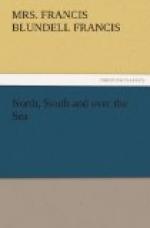“No, but there’s one thing you can’t get out of, Miss Jenny, so clever as ye think yerself,” cried the outraged possessor of the hearthrug. “You be a-comed here on false pertences. Even if my nevvy be dead you han’t a-got no right to these ’ere things now. He wrote it plain, ’I leave ’em all to my sweetheart if I’m killed.’ Well, you wasn’t his sweetheart when he was killed—you was a-walkin’ out wi’ this ’ere chap.”
“Abel Guppy did mean I to have they things,” said Jenny. “I was his sweetheart at the time he wrote it, and if I left off bein’ his sweetheart ’twas because I felt he was too good to live. I knowed he wouldn’t come back—as I tell you I had a porsentiment. I were forced to take up wi’ Sam because I knowed Abel ‘ud never make any livin’ maid his bride.”
“That’s the third time!” cried Sam, ramming on his hat, and making for the door. “I’ve had about enough o’ this. I’ll look out for another maid as hasn’t got a sweetheart i’ th’ New House—you be altogether a cut above the likes of I.”
Susan obligingly opened the door for him, and in a moment he was gone, leaving Jenny staring blankly after him.
The banging of the garden-gate seemed to restore her to her senses. With a scream she threw the paper on the floor, and rushed out of the house, calling wildly on her lover. Soon the sound of the hurrying steps was lost in the distance, and the two women simultaneously turned to each other, eyes and mouth equally round with amazement.
At last Betty, slowly extending her forefinger, pointed to the will.
“I know,” said Susan, finding voice all at once. “I’ve a good mind to pop it i’ the fire.”
Betty shook her head admonishingly.
“I wouldn’t do that,” she said, with a note of reproof in her voice. “’T’ud be real dangerous. Folks could be sent to prison for meddling wi’ wills, an’ sich.”
Susan, who had grasped the document in question, dropped it as if it burnt her.
“My very spoons!” she said with a groan. “I tell ’ee, Betty, I’d a deal sooner bury ’em nor let her have ’em.”
“I d’ ’low you would,” said Mrs. Tuffin commiseratingly; “but I don’t advise ‘ee to do it, my dear—’twouldn’t be safe, an’ you’d be bound to give ’em up one time or another. I d’ ‘low that maid be a-actin’ as she be to spite ye more nor anythin’ else; the more unwillin’ you be, the more she’m pleased.”
“Very like,” agreed Susan. “She knowed I never were for Abel takin’ up wi’ her, an’ al’ays said so much as I could again the match.”
“Well, if you’ll take my advice, Susan, you’ll jist disapp’int her by givin’ in straight off. If I was you I’d jist make up a bundle o’ they things what Abel left her; pack ’em all up an’ pin the will on top, an’ give ’em to carrier to take to her, an’ jist write outside, ’Good riddance o’ bad rubbish,’ or ‘What ye’ve touched ye may take,’ or some sich thing to show ye didn’t care one way or t’other. I d’ ’low that ’ud shame her.”




